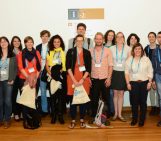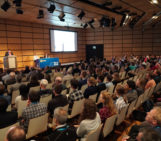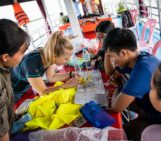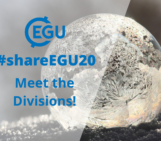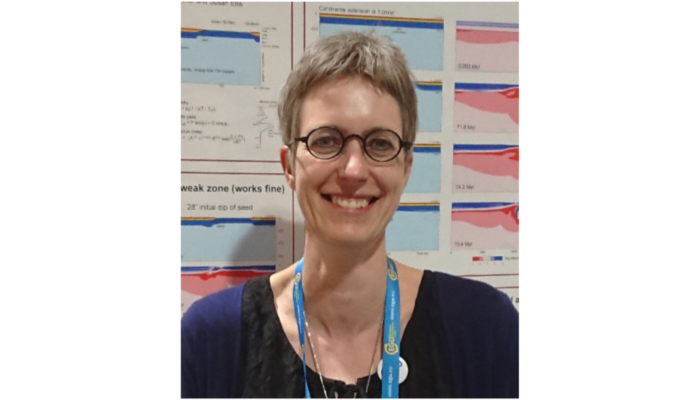
Susanne Buiter, a Professor at RWTH Aachen University in Germany and former President of the Tectonics and Structural Geology Division of EGU, will be stepping down from her current role as Programme Committee Chair at the end of this year’s General Assembly. Whilst that should have happened in Vienna as normal, EGU was faced with the difficult decision to cancel the physical meeting this year in the light of the ongoing coronavirus outbreak. We sat down with Susanne to discuss her term as Programme Committee chair, what it was like taking the General Assembly from Vienna to ‘Sharing Geoscience Online’ in less than 6 weeks and what she hopes for EGU in the future.
Hi Susanne, thank you for speaking with us! The end of this week marks the end of your three-year term as programme committee chair. What was your primary role in this position?
The primary role is to organise the EGU General Assembly. In a very broad sense, you have to make sure that you build a programme that is attractive and will give people a good experience in Vienna. This is a challenge when you think of having to accommodate between 16,000 and 18,000 people! So I work with the Programme Committee to highlight both the strengths of, and the links between, EGU’s Divisions.
Can you tell me what you think has changed about research in Europe in the last three years, and the ways that EGU and the General Assembly have changed as a result?
I would say one is Open Access and Open Science. EGU has always been about these in the way we share abstracts with a creative commons license and in our publishing. But I think the awareness of what it means to do Open Access and Open Science has grown a lot, and it’s been really great to have other scientists see where we’re going with it.
The other main thing is the ‘GreenEGU’. Because, and rightly so, there’s been much more demand recently to organise the General Assembly in a way that has less impact on the environment. And we’ve been working hard on it; this year, we were going to offset the travel of everyone coming to Vienna. EGU also negotiated with train companies to reduce fares and has for a long time provided free public transport in Vienna. We were also planning to have bicycle stands this year!
You have been a driving force between a number of new initiatives at the annual General Assembly; what do you consider your legacy to be?
Well, the GreenEGU was definitely one. I think as scientists and teachers, we have a responsibility to think about how our actions impact the environment. We have to think about what our actions mean for the environment and then, if we decide that we still value travelling to and attending a scientific meeting, we should try to do it in the best way possible.
I also want the General Assembly to be accessible, so that that anybody can participate and feel welcome. This year our focus was on people with hearing difficulties, so we’d planned to test auto-captioning for orals and have audio streaming to support people who use hearing aids. We also hired a professional stenographer for the big sessions that are live streamed. We want to make sure that people feel that they can come to EGU, however they are, and have a good meeting.
Finally, I think my legacy will include the change I made to the programme, where all styles of presentation, PICO, poster or oral, are considered equal and therefore scheduled as equal throughout the day. They are just different ways of presenting – the science is all equally valid. That is something I’m pretty proud of.
During this week, we’re running the EGU 2020 Sharing Geoscience Online as a partial replacement for the physical GA, which is an incredible achievement. What was the hardest part about this decision? And what do you think the benefits of this groundbreaking experiment will be?
It was really hard to cancel it, not only because many people had worked on the meeting already, but also because we had actually scheduled our entire programme! And it was hard to realise that we were not going to meet up with our friends in Vienna.
And then … within two days, we had to come up with a whole new concept! One of the biggest challenges was balancing the 10,000 posters with the other kinds of presentations. How do you make these accessible in a good way? That is why we came up with the displays; this one format that all presentations can be, which was completely new and has given us a totally different view of how we can put things online.
We will be very sorry to see you leave this post. But looking forward, what are your hopes for EGU, for the next few years?
I hope EGU will thrive. And that’s not just the General Assembly, because we also have the journals that are functioning really, really well to promote Open Access to science. I see EGU as a community builder and an organisation that is increasingly recognised as representing our community, and I hope the Union continues to grow in these roles.
Thank you Susanne, and we wish you all the best for the future.
Interview by Hazel Gibson, EGU Communications Officer.

